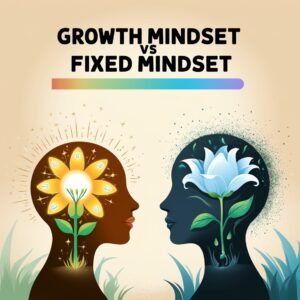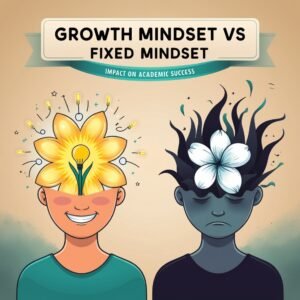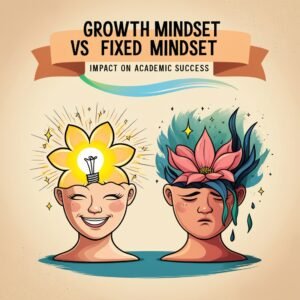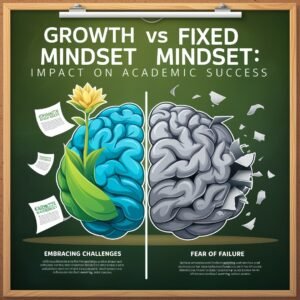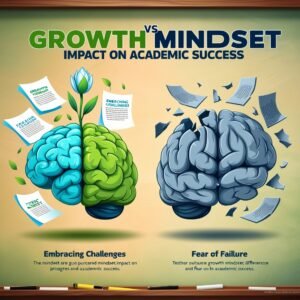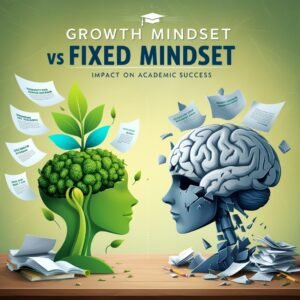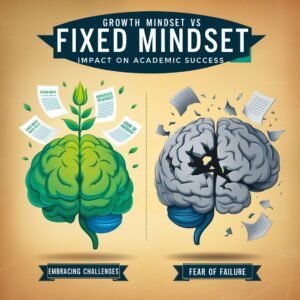“Growth Mindset vs Fixed Mindset: Impact on Academic Success”:
Growth Mindset vs Fixed Mindset: How They Affect Academic Success
What makes some students push through challenges while others shut down at the first sign of failure? It often comes down to mindset—specifically, whether they believe they can grow or think their abilities are fixed.
In classrooms everywhere, mindset is quietly shaping outcomes. Let’s break down what a growth mindset and fixed mindset really mean, and why this difference can make or break academic success.
Growth Mindset: The Belief You Can Improve
A growth mindset is the idea that intelligence and skills aren’t set in stone—you can improve them with effort, practice, and learning from mistakes.
Students with a growth mindset:
- Don’t panic over setbacks.
- See effort as the path to success.
- Embrace challenges instead of dodging them.
- Learn from feedback instead of taking it personally.
They’re more likely to say, “I’m not good at this—yet.”
Fixed Mindset: Stuck with What You’ve Got
A fixed mindset, on the other hand, is the belief that your abilities are pretty much locked in. You’re either smart or you’re not. Good at math or not. There’s no room for change.
Students with a fixed mindset often:
- Avoid difficult tasks.
- Worry about looking “dumb.”
- Blame lack of talent instead of trying harder.
- Struggle to cope with failure.
This mindset can quietly chip away at motivation over time.
How Mindset Impacts Academic Success
- Handling Failure
Let’s say two students bomb a test.
- One says, “I guess I’m just bad at this.” That’s fixed mindset talking.
- The other says, “That didn’t go well—what can I do differently next time?” That’s growth mindset.
Same result, completely different reaction. One stops trying. The other gets back to work.
- Motivation to Learn
Students with a growth mindset believe effort matters. So they put in the time. They study, ask for help, and try new strategies.
In contrast, a fixed mindset often kills motivation. If students think success is about talent, not effort, why bother working harder?
- Willingness to Take Risks
Trying a harder class, raising your hand even when unsure, applying to that scholarship—these all require some risk. Students with a growth mindset are more willing to take that leap. Fixed mindset students often play it safe.
- Long-Term Academic Growth
Over time, these small differences add up. Growth-minded students:
- Stay engaged longer.
- Improve even in subjects they once struggled with.
- Develop grit and resilience.
- Reach higher academic goals.
Real-Life Mindset Moments
Example 1: Struggling in Math
Student A fails a quiz and thinks, “I’ll never be good at this.” They stop trying.
Student B also fails but says, “I didn’t study the right way. Let me try a different method.” They adjust and improve.
Example 2: Feedback from a Teacher
When a teacher points out areas for improvement:
- A fixed mindset student may get defensive or discouraged.
- A growth mindset student sees it as useful information to get better.
How to Help Students Build a Growth Mindset
Parents, teachers, and mentors can make a big difference. Here’s how:
- Praise the Process, Not Just the Result
Instead of saying “You’re so smart,” try “You worked hard on that project.” It sends the message that effort counts.
- Normalize Mistakes
Mistakes aren’t failures—they’re part of learning. Talk about setbacks openly and how people overcome them.
- Use “Yet” Language
Turn “I can’t do this” into “I can’t do this yet.” That tiny word keeps the door to learning open.
- Show Your Own Growth
Adults who share their struggles and how they overcame them model resilience. It makes growth mindset real and relatable.
- Encourage Reflection
Ask students, “What worked?” “What didn’t?” “What will you do differently?” That thinking builds ownership over their learning.
Why Mindset Matters Now More Than Ever
School today comes with pressure—grades, competition, expectations. Add in distractions and burnout, and it’s easy for students to feel stuck or defeated. A growth mindset helps students bounce back, stay curious, and keep moving forward—even when it’s tough.
It’s not about being perfect. It’s about being willing to learn.
Final Thoughts
Academic success isn’t just about how smart someone is. It’s about how they think about learning.
- A growth mindset pushes students to keep trying, keep learning, and stay open to feedback.
- A fixed mindset often leads students to give up or avoid challenges.
The good news? Mindsets aren’t fixed either. They can change. With the right encouragement, students can shift how they see themselves—and change the course of their education.
